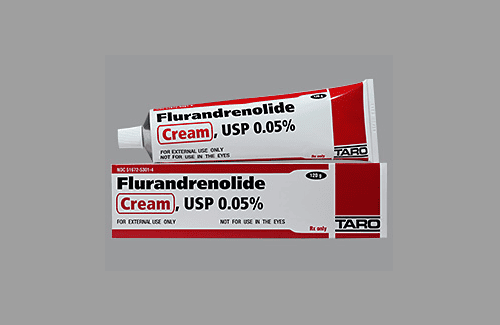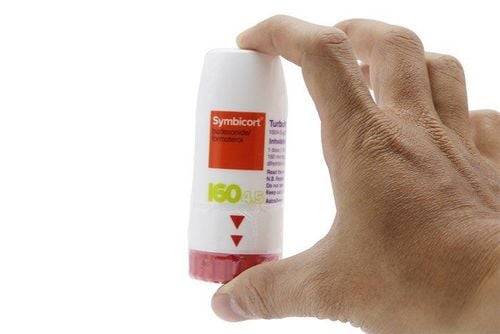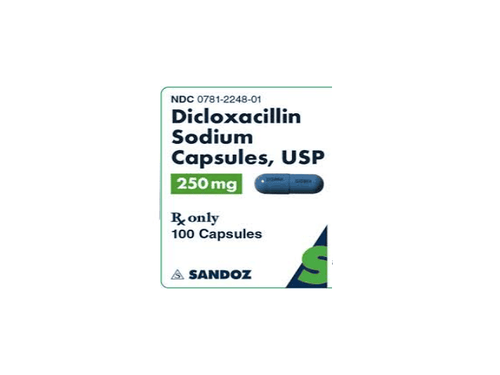This is an automatically translated article.
Dalestone D belongs to the group of anti-allergic drugs, used in cases of hypersensitivity, indicated for the treatment of related diseases such as allergic rhinitis, bronchial asthma, dermatitis, bronchitis.1. What is Dalestone D?
Dalestone D has the main ingredients Betamethasone 1.5mg and Dexlorpheniramine maleate 12mg, prepared in the form of a syrup used to:
Treat allergic diseases when corticosteroid therapy is required such as chronic bronchial asthma, allergic bronchitis allergic rhinitis, allergic rhinitis. Treatment of atopic dermatitis, polyneuritis, contact dermatitis, urticaria.
2. Dosage and how to use Dalestone-D
How to use Dalestone-D:
Take 2-3 times a day. To promote the best effect of the drug and limit the side effects on the intestinal tract, patients should take it with meals or with milk. The dose prescribed will be based on the individual patient's response and tolerability. After achieving the desired response, the patient should gradually reduce the dose until the lowest level and adequate clinical response can be maintained. Patients should not use the drug for too long because it will increase the possibility of drug resistance. Dosage of Dalestone-D:
For adults and children over 12 years old: Use a dose of 5ml (equivalent to 1 teaspoon) but not to exceed 6 teaspoons per day. For children 6-12 years old, the dose is 2.5ml (equivalent to half a teaspoon), not to exceed 3 teaspoons per day. For children from 2 to under 6 years old use 1.25ml. Do not use the drug with babies under 2 months old. Note:
Dosage for children and infants will depend on the severity of the disease and the patient's ability to respond. Dosage is also dependent on age, body weight or body area.
3. Overdosage and treatment
With Betamethasone:
Occurrence of systemic reactions due to overdose of corticosteroids including: Increased appetite, calcium and phosphorus mobilization accompanied by osteoporosis, adrenal insufficiency, nitrogen loss, hyperglycemia, decreased regeneration tissue, increased risk of infection, increased activity of the adrenal cortex, mental and neurological disorders, muscle weakness. Treatment: In case of acute overdose, serum and urine electrolytes should be monitored, with special attention to sodium and potassium balance. In case of chronic toxicity, the patient should gradually reduce the dose of the drug and then discontinue use. In some cases, it is necessary to treat the eyes with electrolyte balance. With Dexchlorpheniramine maleate:
Symptoms of overdose of dexlorpheniramine maleate: Depression and CNS stimulation (especially in children), more serious can cause death, dizziness, tinnitus, decreased vision, lower blood pressure. Treatment: Treat each symptom
4. Possible side effects of Dalestone D
4.1. Side effects of Betamethasone ingredients Undesirable effects of Betamethasone have the influence of dose and duration of treatment.
Common side effects:
Metabolism: Decreased potassium concentration, sodium retention, water retention. Endocrine-related: Irregular menstruation, development of Cushing's syndrome, inhibition of fetal growth if used in pregnant women, decreased glucose tolerance, causing diabetes if the patient is pregnant. risk of disease, increased insulin requirements, or drugs that cause hypoglycemia in people with diabetes. Musculoskeletal involvement: Muscle weakness, loss of muscle mass, osteoporosis, skin atrophy, and aseptic abscess. Uncommon side effects:
Psychiatric related: Mood swings, major depression, insomnia. Eyes: Glaucoma, cataract. Gastrointestinal involvement: Stomach ulcer and possibly subsequent perforation and bleeding, pancreatitis, abdominal distention, esophagitis. Rare side effects:
Skin: Causes allergic dermatitis, urticaria and angioedema. Neurological: Benign raised intracranial pressure Other reactions: Anaphylactoid or hypersensitivity reactions and hypotension or shock reactions. 4.1. Side effects of ingredients Dexlorpheniramine maleate Undesirable and most common effects of dexlorpheniramine maleate are drowsiness, headache, dry mouth, dry nose and throat, dizziness, fatigue, causing digestive disorders with the expression of eating no food. appetite, nausea, constipation, diarrhea.
5. Dalestone EASY drug interactions
Interaction with Betamethasone:
Paracetamol: Corticosteroids induce liver enzymes to form a metabolite of paracetamol which is hepatotoxic. Therefore, there is an increased risk of hepatotoxicity if corticosteroids are taken with paracetamol in high doses or used for a long time. Oral antidiabetic drugs or insulin: Glucocorticoids increase glucose levels, making it necessary to adjust the dose of either drug when used concurrently. Glycoside digitalis: Concomitant administration of glucocorticoids may increase the likelihood of cardiac arrhythmias or digitalis toxicity associated with hypokalemia. Concomitant use with Phenobarbital, phenytoin, rifampicin or ephedrine: Increases the metabolism of corticosteroids and reduces the therapeutic effect of the drug. Coumarin-type anticoagulants: When concomitant use of corticosteroids increases or decreases the anticoagulant effect, it is necessary to adjust the dose of the drug. Concomitant use of non-steroidal anti-inflammatory drugs or alcohol: When used in combination with glucocorticoids, the severity of peptic ulcer disease may be increased. Corticosteroids increase blood levels of salicylates, so patients need to be cautious when taking aspirin in combination with corticosteroids in case of hypoprothrombinemia. Interaction with ingredients Dexchlorpheniraminmaleat:
Mono-amino-oxydase (M4OJ) inhibitors: Prolong and increase the effect of antihistamines causing severe hypotension. Concomitant use with tricyclic antidepressants, barbiturates or other CNS depressants increases the sedative effect of dexlorpheniramine maleate. Anticoagulants: Reduces the effectiveness of oral anticoagulants, due to inhibition by antihistamines.
6. Be careful when taking medicine
For Betamethasone:
Use with caution in patients with congestive heart failure, myocardial infarction, hypertension, diabetes, epilepsy, glaucoma, hypothyroidism, liver failure, osteoporosis, ulcers stomach, psychosis and kidney failure. For people with tuberculosis, if using corticosteroid therapy for a long time, it is necessary to closely monitor and use chemoprophylaxis against tuberculosis. The drug should be used with caution in people who do not have an immune response to corticosteroids, because these cases are prone to chickenpox or severe Herpes zoster infection. Live vaccines should not be used in patients receiving high-dose systemic corticosteroid therapy, if necessary, after at least 3 months. If the patient uses the drug for a long time, it is necessary to monitor his health regularly. For Dexchlorpheniramine maleate:
Elderly patients are at risk of orthostatic hypotension, dizziness, drowsiness, chronic constipation (due to the risk of bowel obstruction or paralysis), prostate swelling, Patients with liver failure, severe renal failure due to the risk of drug accumulation. Avoid drinking alcohol and drugs containing alcohol during treatment. Use in pregnancy: Use of corticosteroids during pregnancy or in those planning a pregnancy must weigh the benefits and risks of the drug to the mother and fetus. Because there have been cases of drugs affecting fetal weight when the mother used corticosteroids for a long time. Women during pregnancy must be carefully monitored for signs of adrenal insufficiency. Lactation: The drug is likely to be excreted in breast milk and adversely affect the infant because the drug inhibits the growth of the baby and causes effects such as decreased adrenal function. Above is all information about the uses, dosage and precautions when using Dalestone-D medicine. To ensure safety for your health and maximize the effectiveness of your treatment, you need to take Dalestone-D exactly as directed by your doctor.
Please dial HOTLINE for more information or register for an appointment HERE. Download MyVinmec app to make appointments faster and to manage your bookings easily.













